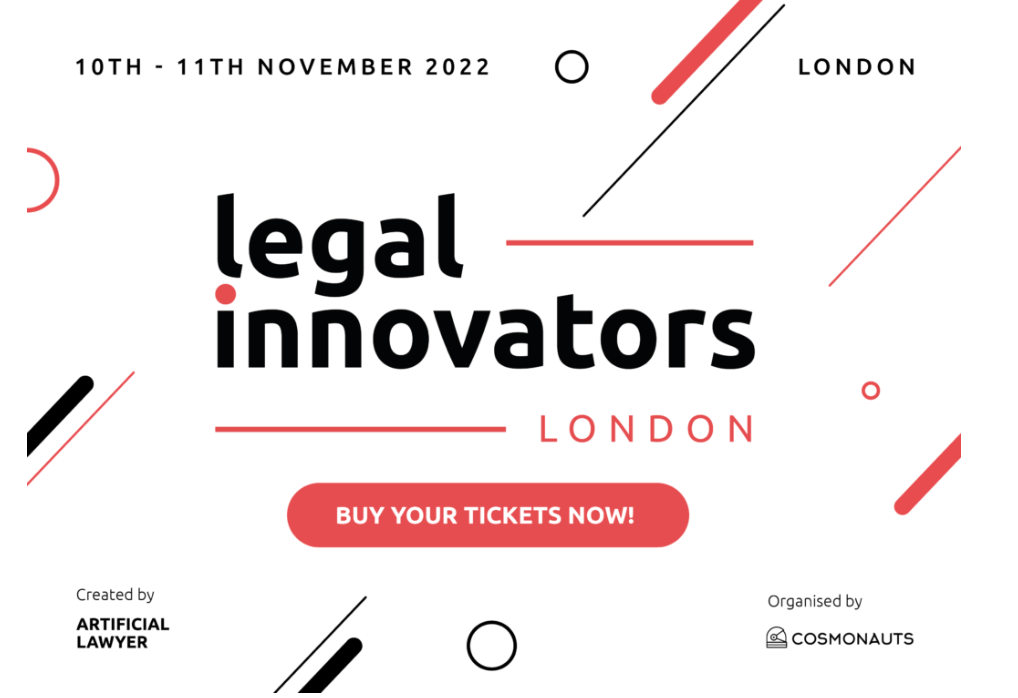
If Legal Geek is one of the key barometers of our sector then there is a lot to be optimistic about. But, we didn’t see much there that was technologically new or challenging. Instead the dominant theme was implementing what is already known and understood.
From Developing to Doing
People attend tech conferences for multiple reasons: to network and meet old friends – and Legal Geek was excellent for this; to learn practical stuff about using the tech the conference is focused on – the event also covered this very well; and to see ‘what’s new’, what’s challenging things, what’s going to upset the status quo – and there was very little of that (and it’s worth saying there was very little of that at Legal Week in New York in March either, another major conference in our sector).
While I was at the two-day Legal Geek event last week it was great to catch up with plenty of people I’d perhaps only spoken to via Zoom in recent months, and during those conversations one often repeated question was: ‘So, what’s new that you’ve seen here?’ I pondered things for a moment or two and then returned the question, to which the other party also didn’t have much to say on the topic.
Conversations then went in a dozen different directions, but new technology was not one of them – which perhaps is paradoxical for a large gathering of people brought together ostensibly because of one thing: technology.
Last week there were no Steve Jobs-like personae walking on stage in black turtlenecks to unveil a legal tech version of a new category-forming product that would shake things up. What we had were plenty of really experienced and clever people telling the audience about how to tackle problems with the tech that was already well-developed and understood.
There were practical sessions on how to use no-code software to build tools for your clients – and I saw a great one with BRYTER featuring Kerry Westland at Addleshaw Goddard and Greg Baker at Linklaters. There were also practical and useful presentations from Tom Dunlop at Summize along with Roisin Noonan at The Law Boutique, among many others. It was grounded in the real world of today. It was meant to be directly useful. And that’s got to be a good thing.
And yet….I couldn’t help but feel that things have reached some kind of plateau and that mostly what we have ahead of us for a while now is ‘hard yards’ and a long implementation road. Which again, we should be happy about as that means useful outputs, and yet…..
Innovation and Implementation
Innovation is in the eye of the beholder. A junior associate who has not spent much time looking at legal tech tools may find the array of software at most trade shows to be mind-boggling.
Personally, I saw a lot of great companies providing roughly similar offerings to what they were offering before and really focusing on, as noted, helping people to get value from it, and simply getting it into people’s hands so that they could even attempt to get value from it…!
But, one company that I thought has done something new is The Law Machine – which has turned document automation on its head by atomising contracts into their constituent parts, e.g. clauses and definitions, and then letting you build the contract with those parts. I.e. there is no template as such, there are only elements of a document, which you then assemble like Lego.
I really liked the way that founder Andrew Stokes has broken down the problem and used tech to make assembly more intuitive and flexible.
It was also good to catch up with Tim Pullan, CEO of ThoughtRiver, which is proudly stating that its NLP doc analysis capability, named Lexible Fusion, has reached a breakthrough, and which they say ‘represents a momentous leap forward in legal AI accuracy, changing the game for how legal professionals work and negotiate’.
We’ll probably need an industry-wide bake off versus other companies to truly know where ThoughtRiver now stands against the likes of Della, Kira, eBrevia, Luminance and others, but it was good to see a legal AI company really pushing hard on a key barrier to such technology, i.e. dependable accuracy.
And there was also a presentation on NFTs in the legal world – which I have to admit I walked out of. It’s an interesting field of research, but most of the core ideas we have seen before back when blockchain tech got started some years ago and although law firms may end up advising on such things, when it comes to actually changing the legal world it looked ‘unlikely’ rather than ‘disruptive’.
Overall then there are some valuable tech steps being made, but it’s fair to say such things didn’t dominate Legal Geek, which instead was all about the day-to-day grind of implementation more than anything else. But, is that a bad thing?
Innovation in a Plateaued Tech Landscape
If the tech has (mostly) plateaued – for now – and what most companies are offering is the same as a few years ago, plus some incremental improvements and add-on features, and where most people in the sector are focused is actually putting that tech into use, isn’t that a good place to be?
In short, yes. It’s way better that more law firms and inhouse teams are using the tech of what used to be challenger startups that have now become part of the main market, than having a bunch of radical new seed level businesses making lots of headlines but no-one actually using what they are building.
It all boils down to: where are we trying to get to? What problems are we trying to solve? And we don’t have time to dig into that one here, but suffice it to say, if the goal is to reduce inefficiency in the legal sector then there is plenty out there now to help, across nearly every aspect of commercial law.
Combine that with new ways of working, rethinking the use of legal data, and applying different business models, and the legal sector is clearly moving in the right direction. That is something to celebrate.
That said, it would be great to feel once again that everything is going to be upended by a totally new wave of legal technology. But, we are where we are, and it’s a good place to be, even if my inner revolutionary still yearns for the radical vibes of days only recently consigned to history.
(And thanks to Jimmy for once again putting on such a great event!)
By Richard Tromans, Founder, Artificial Lawyer, Oct 2022
And on the subject of practical implementation and driving innovation internally at law firms and within inhouse legal teams….there’s more to come….!
Legal Innovators UK Conference – London, November 10 + 11
If you found the topics covered in this article of interest then come along to the landmark two-day legal innovation conference in London. Day One: Law Firms and ALSPs, Day Two: Inhouse and Legal Ops. We have a fantastic line-up of speakers from across the legal and legal tech ecosystems for this event focused on learning, sharing and networking. See you there!
Tickets and more information can be found here.
